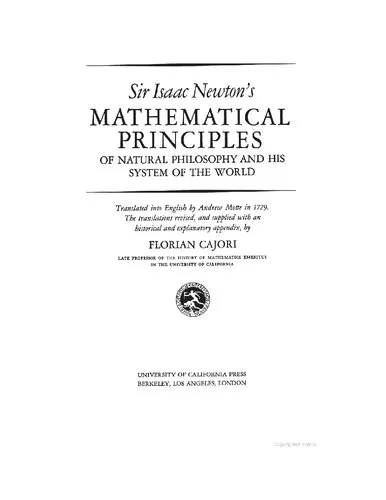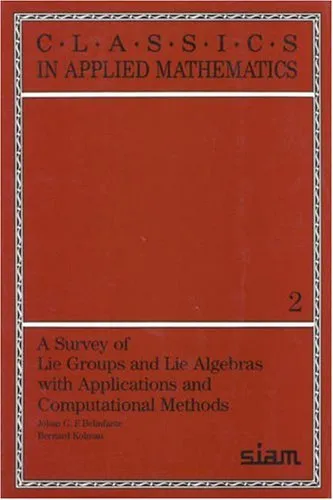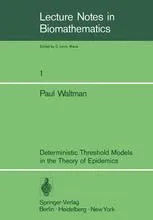Mathematical Approaches to Problems in Resource Management and Epidemiology: Proceedings of a Conference held at Ithaca, NY, Oct. 28–30, 1987
3.8
بر اساس نظر کاربران

شما میتونید سوالاتتون در باره کتاب رو از هوش مصنوعیش بعد از ورود بپرسید
هر دانلود یا پرسش از هوش مصنوعی 2 امتیاز لازم دارد، برای بدست آوردن امتیاز رایگان، به صفحه ی راهنمای امتیازات سر بزنید و یک سری کار ارزشمند انجام بدینکتاب های مرتبط:
معرفی کتاب
کتاب Mathematical Approaches to Problems in Resource Management and Epidemiology اثری جامع و برجسته است که نتیجه کنفرانسی در اکتبر ۱۹۸۷ در Ithaca, NY بوده و به بررسی کاربردهای مهم ریاضیات در مدیریت منابع و اپیدمیولوژی میپردازد. گردآورندگان این اثر، مجموعهای از مقالات تخصصی را ارائه میدهند که به تحلیل مسائل پیچیده علمی و چگونگی استفاده از ابزار ریاضی برای حل آنها اختصاص دارد.
خلاصهای از کتاب
این کتاب به طور جامع کارکردهای ریاضیات در دو حوزه کلیدی، یعنی مدیریت منابع و اپیدمیولوژی را شرح میدهد. موضوعاتی از قبیل مدلسازی سیستمها، کارایی منابع، و بررسی نظریات اپیدمیولوژیک از جمله مباحث برجسته آن میباشند. کنفرانس مبدأ این مجموعه، محققان مطرح را از رشتههای مختلف گرد هم آورد تا در مورد چالشهای موجود در این زمینهها و راهحلهای مبتنی بر تکنیکهای ریاضی بحث کنند.
در مدیریت منابع، بخش بزرگی از مباحث به بهینهسازی و کنترل مسائل تخصیص منابع اختصاص یافته است. این بحثها شامل مدلسازی ریاضی برای مدیریت جنگلها، ذخایر ماهی، و سایر منابع طبیعی میشوند. در حوزه اپیدمیولوژی، نویسندگان بر مدلسازی انتشار بیماریها، اثر رفتار انسانی بر شیوع بیماری، و کاربرد آنالیزهای ریاضی در توسعه استراتژیهای بهداشت عمومی تمرکز میکنند.
نکات کلیدی
- تلفیق کاربردهای عملی و نظری مدلهای ریاضی.
- ارائه چارچوبهای نوآورانه برای مدیریت منابع طبیعی.
- بررسی ارتباط بین رفتار انسانی و روند شیوع بیماریها.
- استفاده از مدلهای ریاضی برای پیشبینی و کنترل اپیدمیها.
- تحلیل سناریوهای متعدد برای تخصیص منابع در شرایط تغییرپذیر.
جملات معروف
"ریاضیات، زبانی است که ما را قادر میسازد پیچیدگیهای جهان را درک و پیشبینی کنیم." - از پیشگفتار کتاب
"مدلسازی علمی، نقشی اساسی در کشف الگوهای عمیق طبیعت ایفا میکند." - یکی از نویسندگان
"اپیدمیولوژی و مدیریت منابع، در عصر حاضر بیش از همیشه نیازمند رویکردهای میانرشتهای هستند." - گردآوری کننده
چرا این کتاب مهم است؟
با افزایش پیچیدگیهای جوامع انسانی و چالشهای محیط زیستی، استفاده از روشهای پیشرفته ریاضی به ابزاری حیاتی برای مقابله با مشکلات مختلف تبدیل شده است. این کتاب، پایهای علمی و عملی برای مواجهه با چنین مسائلی فراهم میآورد.
مباحثی که در اینجا ارائه شده، نه تنها به مدیران و برنامهریزان کمک میکند تا تصمیمات بهتری اتخاذ کنند، بلکه به محققان نیز چارچوبهای نظری جدیدی ارائه میدهد. همچنین، خوانندگان میتوانند درک عمیقی از نقش ریاضیات در تحلیل و بهبود وضعیت سیاستهای کاربردی مرتبط با منابع طبیعی و بهداشت عمومی پیدا کنند.
با توجه به زمینههای گسترده مورد بحث و ارتباط موضوعات با جنبههای حیاتی زندگی روزمره، این کتاب برای کسانی که به ارتباط میان ریاضیات و علوم اجتماعی علاقهمند هستند، منبعی بینظیر است.
Introduction
"Mathematical Approaches to Problems in Resource Management and Epidemiology" is a compelling collection of research contributions and perspectives brought forth during a pivotal conference held at Ithaca, New York, from October 28 to 30, 1987. Edited by renowned scholars Carlos Castillo-Chavez, Simon A. Levin, and Christine A. Shoemaker, this book delves into the intricate intersection of mathematics with critical domains such as resource management and epidemiology. Aimed at researchers, policymakers, and interdisciplinary scholars, it presents a rich repository of innovative methods and case studies that demonstrate the crucial role of mathematical modeling in tackling real-world challenges.
The text not only provides thought-provoking insights but also establishes a foundation for further exploration into the application of mathematics for addressing environmental limitations, population dynamics, disease outbreaks, and the sustainable management of resources. By merging mathematical rigor with practical applications, this book unveils the critical synergy between theory and practice.
Detailed Summary of the Book
This book comprises a curated selection of papers presented during the conference, each reflecting a distinct yet interconnected aspect of resource management and epidemiology. The chapters emphasize the powerful role of mathematical tools in understanding complex phenomena, ranging from population models to natural resource consumption, and from disease transmission dynamics to optimization of resource allocation. The material draws on disciplines such as applied mathematics, ecology, epidemiology, and economics, creating a rich interdisciplinary framework.
Key challenges addressed include sustainable harvesting of renewable resources, strategies for epidemic control, and the mitigation of environmental degradation. Mathematical models—ranging from differential equations to probabilistic approaches and algorithms—are used to develop predictions and optimize strategies. Moreover, the book stresses the importance of balancing theoretical constructs with empirical data to ensure that models remain grounded in reality. The collaboration between researchers and practitioners presented here underscores the need for actionable insights derived from robust mathematical analyses.
Key Takeaways
- Mathematics serves as a universal language that bridges the gap between diverse fields such as epidemiology, ecology, and resource management.
- Integrative approaches combining mathematical models and real-world data are essential for solving pressing global issues like resource scarcity and emerging infectious diseases.
- The conference highlighted the importance of interdisciplinary collaboration for building resilient and sustainable frameworks in both ecological and public health contexts.
- Mathematical tools such as optimization, simulation, and dynamic systems modeling remain indispensable in formulating long-term strategies for equitable and sustainable management of resources.
- This book serves as a springboard for future research and innovation in using quantitative methods to address societal and environmental challenges.
Famous Quotes from the Book
"Mathematics is not just an abstract pursuit—it is a tool for understanding the principles that govern life, the environment, and the systems upon which humanity depends."
"The success of a model lies not in its complexity, but in its ability to capture the essential dynamics and to guide practitioners toward actionable solutions."
Why This Book Matters
In a world increasingly shaped by environmental, social, and economic challenges, this book's focus on integrating mathematical methodologies with practical applications offers unparalleled value. The 1987 conference served as a seminal moment in recognizing that strategies for managing resources must account for population growth, disease transmission, and environmental sustainability in a mathematically disciplined manner. This collection solidifies those principles and continues to inspire contemporary research.
Additionally, the book emphasizes the relevance of mathematics beyond academia. It demonstrates its potential to shape critical decisions related to epidemic control, conservation policy, and public health interventions. With the accelerating pace of global challenges such as climate change, biodiversity loss, and pandemic threats, the content of this volume is increasingly significant. By giving researchers and policymakers access to rigorously tested models and processes, "Mathematical Approaches to Problems in Resource Management and Epidemiology" remains an enduring resource for innovative problem-solving.
دانلود رایگان مستقیم
شما میتونید سوالاتتون در باره کتاب رو از هوش مصنوعیش بعد از ورود بپرسید
دسترسی به کتابها از طریق پلتفرمهای قانونی و کتابخانههای عمومی نه تنها از حقوق نویسندگان و ناشران حمایت میکند، بلکه به پایداری فرهنگ کتابخوانی نیز کمک میرساند. پیش از دانلود، لحظهای به بررسی این گزینهها فکر کنید.
این کتاب رو در پلتفرم های دیگه ببینید
WorldCat به شما کمک میکنه تا کتاب ها رو در کتابخانه های سراسر دنیا پیدا کنید
امتیازها، نظرات تخصصی و صحبت ها درباره کتاب را در Goodreads ببینید
کتابهای کمیاب یا دست دوم را در AbeBooks پیدا کنید و بخرید
1345
بازدید3.8
امتیاز0
نظر98%
رضایتنظرات:
3.8
بر اساس 0 نظر کاربران
Questions & Answers
Ask questions about this book or help others by answering
No questions yet. Be the first to ask!















